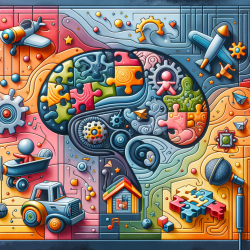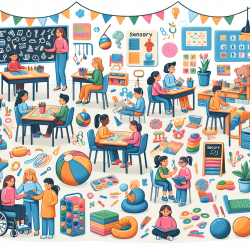Introduction
As a speech-language pathologist, understanding the nuances of child development is crucial for creating effective therapy plans. A recent study, "Influence of Ideational Praxis on the Development of Play and Adaptive Behavior of Children with Autism Spectrum Disorder: A Comparative Analysis," sheds light on how ideational praxis influences play and adaptive behavior in children with Autism Spectrum Disorder (ASD). This blog will delve into the key findings and their implications for practitioners.
Understanding Ideational Praxis
Ideational praxis refers to the ability to generate ideas for actions with objects. This cognitive process is vital for the planning and execution of play and other adaptive behaviors. The study found that children with ASD often show significant deficits in ideational praxis compared to their typically developing peers. These deficits can impact their ability to engage in symbolic play and adaptive leisure activities.
Key Findings
- Play Skills: The study found a strong correlation (r = 0.649; p = 0.01) between ideational praxis and play skills development. Children with better ideational skills demonstrated more complex and varied play behaviors.
- Adaptive Behavior: There was a significant relationship between ideational praxis and adaptive leisure behavior (r = 0.338; p = 0.04) and social adaptive behavior (r = 0.319; p = 0.04). This indicates that children who can generate more ideas are better at engaging in leisure activities and social interactions.
- Regression Analysis: Multiple linear regression models confirmed that ideational praxis significantly influences play development (p = 0.005) and adaptive leisure skills (p = 0.004), but not social interaction skills (p > 0.05).
Implications for Practitioners
These findings highlight the importance of incorporating ideational praxis assessments into your practice. By identifying deficits in this area, you can tailor interventions to improve not only motor planning and execution but also the cognitive processes that precede these actions.
Here are some actionable steps:
- Assess Ideational Praxis: Use tools like the Test of Ideational Praxis (TIP) to evaluate your clients. This will help you understand their ability to generate ideas and plan actions.
- Structured Play Interventions: Incorporate structured play activities that encourage idea generation. Use toys and materials that require the child to think of multiple uses.
- Parent and Caregiver Involvement: Educate parents and caregivers about the importance of ideational praxis. Provide them with strategies to encourage idea generation during playtime at home.
Encouraging Further Research
While this study provides valuable insights, further research is needed to explore the long-term effects of improving ideational praxis on overall adaptive behavior. Encourage your colleagues to delve into this area and share their findings to build a robust body of evidence.
Conclusion
Understanding and addressing ideational praxis can significantly enhance the developmental outcomes for children with ASD. By focusing on this often-overlooked aspect, you can create more comprehensive and effective therapy plans.
To read the original research paper, please follow this link: Influence of Ideational Praxis on the Development of Play and Adaptive Behavior of Children with Autism Spectrum Disorder: A Comparative Analysis.










